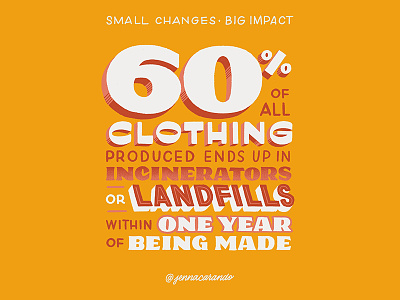Small Changes, Big Impact
60% of all clothing produced ends up in incinerators or landfills within a year of being made (McKinsey 2016). on top of that, the average person buys 60% more clothing than they did 15 years ago, and keeps them for about half as long (Greenpeace 2017).
fast fashion takes an enormous toll on the environment and on the people producing the clothing. increased demand has caused companies to drastically increased their production, but they have not matched these improvements in terms of environmental impact. most consumers aren't even aware of the social and environmental costs of fast fashion.
did you know... • polyester can take up to 200 years to break down • polyester production emitted about 1.5 trillion pounds of greenhouse gases in 2015, the equivalent of the annual emissions of 185 coal-fired power plants (World Resources Institute 2017) • garment manufacturing accounts for 20% of global industrial water pollution (World Resources Institute 2017)
so, how can we avoid feeding into the fast fashion frenzy? 🚫 avoid synthetic materials. polyester is basically a plastic thread. acrylic is even more toxic to produce. viscose rayon turns plants into a textile through a toxic, polluting process and is contributing to the disappearance of rainforests. most synthetic fibers shed microfibers into waterways when you wash your clothing (and end up in our seafood.) ♻️ look for clothing made from recycled materials. you'll financially support the recycling industry and keep plastic waste from the landfill and ocean. @girlfriend is a great example — they make their active wear out of old water bottles and fishing nets! 🌿 opt for natural materials. avoid conventional cotton, which relies on pesticides and herbicides, and opt for organic cotton. tencel is a viscose rayon alternative made from sustainably-sourced eucalyptus trees. other low-impact natural textiles include silk, hemp, linen, and wool.
I recognize that purchasing natural materials tends to be more costly, and is not accessible for everyone. in a future post, I'll talk about cost effective alternatives. have ideas for how to move from fast to slow fashion? I'd love to hear! 💚
follow along on Instagram!








